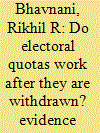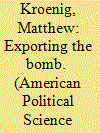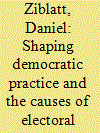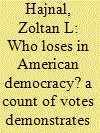|
|
|
Sort Order |
|
|
|
Items / Page
|
|
|
|
|
|
|
| Srl | Item |
| 1 |
ID:
090840


|
|
|
|
|
| Publication |
2009.
|
| Summary/Abstract |
Criticisms of Quentin Skinner's approach to the study of the history of political thought have generally failed to directly address the philosophical presuppositions on which Skinner himself relies. Those presuppositions involve, primarily, theories of language associated most closely with Austin, Searle, and Grice. An investigation of the uses that Skinner makes of philosophical pragmatics raises serious doubts about a number of his central claims. Moreover, those philosophical resources actually point toward a decidedly non-Skinnerian approach that focuses not primarily on discovering or reconstructing historical circumstances, but on uncovering and explicating structures of argumentation.
|
|
|
|
|
|
|
|
|
|
|
|
|
|
|
|
| 2 |
ID:
090824


|
|
|
|
|
| Publication |
2009.
|
| Summary/Abstract |
Do electoral quotas for women alter women's chances of winning elections after they are withdrawn? I answer this question by examining an unusual natural experiment in India in which randomly chosen seats in local legislatures are set aside for women for one election at a time. Using data from Mumbai, I find that the probability of a woman winning office conditional on the constituency being reserved for women in the previous election is approximately five times the probability of a woman winning office if the constituency had not been reserved for women. I also explore tentative evidence on the mechanisms by which reservations affect women's ability to win elections. The data suggest that reservations work in part by introducing into politics women who are able to win elections after reservations are withdrawn and by allowing parties to learn that women can win elections.
|
|
|
|
|
|
|
|
|
|
|
|
|
|
|
|
| 3 |
ID:
090833


|
|
|
|
|
| Publication |
2009.
|
| Summary/Abstract |
Candidates often make ambiguous statements about the policies they intend to pursue. In theory, ambiguity affects how voters make choices and who wins elections. In practice, measurement and endogeneity problems have impeded empirical research about the consequences of ambiguity. We conducted survey experiments that overcame these obstacles by manipulating a common form of ambiguity: the imprecision of candidate positions. Our data show that, on average, ambiguity does not repel and may, in fact, attract voters. In nonpartisan settings, voters who have neutral or positive attitudes toward risk, or who feel uncertain about their own policy preferences, tend to embrace ambiguity. In partisan settings, voters respond even more positively to ambiguity; they optimistically perceive the locations of ambiguous candidates from their own party without pessimistically perceiving the locations of vague candidates from the opposition. We further find, through analysis of two additional new data sets, that candidates often take-and voters frequently perceive-ambiguous positions like the ones in our experiments. The pervasive use of ambiguity in campaigns fits with our experimental finding that ambiguity can be a winning strategy, especially in partisan elections.
|
|
|
|
|
|
|
|
|
|
|
|
|
|
|
|
| 4 |
ID:
090838


|
|
|
|
|
| Publication |
2009.
|
| Summary/Abstract |
Why do states provide sensitive nuclear assistance to nonnuclear weapon states, contributing to the international spread of nuclear weapons? Using a new data set on sensitive nuclear transfers, this article analyzes the determinants of sensitive nuclear assistance. I first describe a simple logic of the differential effects of nuclear proliferation, which I use to generate hypotheses about the conditions under which states provide sensitive nuclear assistance. I then show that the strategic characteristics of the potential nuclear suppliers are the most important determinants of sensitive nuclear assistance. Explanations that emphasize the importance of economic motivations do not find support in the data. This article presents a new approach to the study of the spread of nuclear weapons, focusing on the supply side of nuclear proliferation.
|
|
|
|
|
|
|
|
|
|
|
|
|
|
|
|
| 5 |
ID:
090821


|
|
|
|
|
| Publication |
2009.
|
| Summary/Abstract |
Why is there so much alleged electoral fraud in new democracies? Most scholarship focuses on the proximate cause of electoral competition. This article proposes a different answer by constructing and analyzing an original data set drawn from the German parliament's own voluminous record of election disputes for every parliamentary election in the life of Imperial Germany (1871-1912) after its adoption of universal male suffrage in 1871. The article analyzes the election of over 5,000 parliamentary seats to identify where and why elections were disputed as a result of "election misconduct." The empirical analysis demonstrates that electoral fraud's incidence is significantly related to a society's level of inequality in landholding, a major source of wealth, power, and prestige in this period. After weighing the importance of two different causal mechanisms, the article concludes that socioeconomic inequality, by making elections endogenous to preexisting social power, can be a major and underappreciated barrier to the long-term process of democratization even after the "choice" of formally democratic rules.
|
|
|
|
|
|
|
|
|
|
|
|
|
|
|
|
| 6 |
ID:
090831


|
|
|
|
|
| Publication |
2009.
|
| Summary/Abstract |
The theory of spatial voting has played a large role in the development of important results across many areas of political science. Directly testing the foundational assumptions of spatial voting theory, however, has not been possible with existing data. Using a novel survey design, this article obtains estimates of voter ideology on the same scale as candidate positions. The results of this scaling demonstrate that voters possess meaningful ideologies and, furthermore, that these beliefs are strongly related to the sorts of policy proposals considered in Congress. These ideology estimates are then used to uncover the actual relationships between ideology and vote choice for citizens of various types in the 2004 presidential election. Although the choices of independent voters are shown to be largely consistent with the assumptions of spatial voting theory, the decision rules used by partisans differ strongly from what unbiased spatial voting would imply. Although partisans do converge toward the behavior of independents, and hence toward the assumptions of spatial voting theory, as information levels increase, we see that even highly informed partisans show significant differences from what would be implied by unbiased spatial voting theory.
|
|
|
|
|
|
|
|
|
|
|
|
|
|
|
|
| 7 |
ID:
090836


|
|
|
|
|
| Publication |
2009.
|
| Summary/Abstract |
A central challenge in political economy is to identify the conditions under which legislators seek to "bring home the pork" to constituents. We conduct the first systematic analysis of one determinant of constituency service, voter attachment to political parties, holding constant electoral and political institutions. Our analysis takes advantage of data from a unique type of public spending program that is proliferating across developing countries, the constituency development fund (CDF), which offers more precise measures of legislator effort than are common in the literature. Examining the CDF in India, we find that legislator effort is significantly lower in constituencies that are party strongholds. This result, which is robust to controls for alternate explanations, implies that legislators pass on pork when voters are more attached to political parties. It has implications not only for understanding political incentives and the dynamics of party formation, but also for evaluating the impact of CDFs.
|
|
|
|
|
|
|
|
|
|
|
|
|
|
|
|
| 8 |
ID:
090829


|
|
|
|
|
| Publication |
2009.
|
| Summary/Abstract |
Critics have long feared that America's winner-take-all electoral system would undermine the interests of minorities. Unfortunately, few available tests broadly assess how well minorities fare in a democracy. To gauge winners and losers in the American case, I introduce a new measure of representation. For any election, I count up how many voters from each demographic group vote for a candidate that loses. After comparing this new measure to its alternatives, I use data from the entire series of Voter News Service exit polls and a sample of mayoral elections to determine which kinds of voters end up losers. I find that across the range of American elections, African Americans are consistently more likely than other groups to end up losers, raising questions about equity in American democracy. The one exception to the pattern of black failure-congressional House elections-suggests ways to better incorporate minority interests.
|
|
|
|
|
|
|
|
|
|
|
|
|
|
|
|
|
|
|
|
|